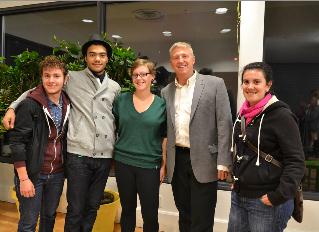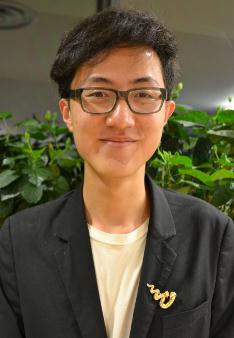
From left, Triangle graduates Shane Camastro, David Jason, Rosa Brooks and Danielle Sutherland (far right) with John Campey (second from right). Credit: Andrea Houston
Graduates from Toronto’s Triangle Program attended a community forum on Sept 26 to express concerns that launching a queer-centric high school could potentially put the existing program in jeopardy.
Community members at the meeting overwhelmingly voted against pursuing the idea.
University of Toronto student Fan Wu, 20, says he has decided not to submit an application to the Toronto District School Board (TDSB) for a queer-centric alternative school. Applications are due at the end of September.
Wu recently told Xtra he was working with TDSB staff members to develop a proposal for a high school that would welcome queer teachers and students.
But Wu says he isn’t disappointed. He thinks the meeting provided space for an important discussion with local queer leaders working in education, many of whom vowed to continue the dialogue to ensure resources for lesbian, gay, bisexual and trans youth are available in every school.
“I think tonight was extremely generative and productive,” says Wu, who is also a former TDSB student trustee. “I certainly learned a lot from the community tonight that I hadn’t known before, which is really crucial to me. The bottom line is we need a cultural shift and attention paid to our queer students.”
Several of those who attended the meeting made a commitment to continue working toward a more equitable curriculum. “That is the goal we share, to change the Ontario curriculum at its core,” Wu said.
Xtra was the only media permitted in the forum.
Triangle Program graduate Shane Camastro, 20, says the school Wu wants already exists and is successful. “The Triangle Program is a queer school,” he says. “We are talking about queer-centric curriculum. The Triangle Program even made math gay.”
Rosa Brooks, 20, who grew up with two moms, says the Triangle Program has evolved beyond a crisis intervention model. “I don’t understand what the difference would be.”
Triangle graduate David Jason, 21, says it’s clear there is a demand for the kind of specialized alternative school that caters to queer and gender-nonconforming students, whether in a crisis situation or not.
“We need to build on that instead of going out and creating something else,” he says. “I’m not against starting a queer school, but I think it should be an extension of the Triangle Program. Call it Triangle Two. Expand the Triangle Program.”
Likewise, there’s no reason all Ontario schools can’t have queer resources, he says.
“Instead of just talking about GSAs, we need queer history in history class; we need to be talking about [queer writers] in English class.”
John Campey, one of the founders of the Triangle Program, told Wu that resources would be better used expanding the existing school, as well as advocating the province for more queer-focused curriculum for all schools.
“I urge you to be very cautious before doing this,” he told Wu at the meeting. “If there’s anything that jeopardizes Triangle, there will be a very strong community response. To address queer suicide and queer dropout rates, I don’t believe this will do that. The lack of resources in the mainstream system is the cause.”
Another founder, Metropolitan Community Church pastor Brent Hawkes, whose church is the home of the Triangle Program, says creating a separate “boutique school puts the Triangle Program at risk.”
Meanwhile, queer activist Casey Oraa, who is also vice-chair of Queer Ontario, says he applauds Wu for coming up with a new idea.
“We need to really think about our education system and find more ways we can support youth,” he says. “Curriculum is provincially mandated.”
Oraa says the long-awaited updated sex education curriculum, which was shelved by the Ministry of Education in 2010, needs to get into classrooms. “The consultations were supposed to have happened ages ago and still have not happened.”
Javier Davila, a teacher and advisor in the TDSB’s office for gender-based violence prevention, defends Wu’s idea. He says LGBT students have a high dropout rate and need extra supports.
“Clearly, there’s many students whose needs are not being met,” he says. “Tonight we learned the Triangle Program is benefiting some students, and they are very happy about that, but there’s many whose needs are not being met. They should have a choice.”

 Why you can trust Xtra
Why you can trust Xtra


